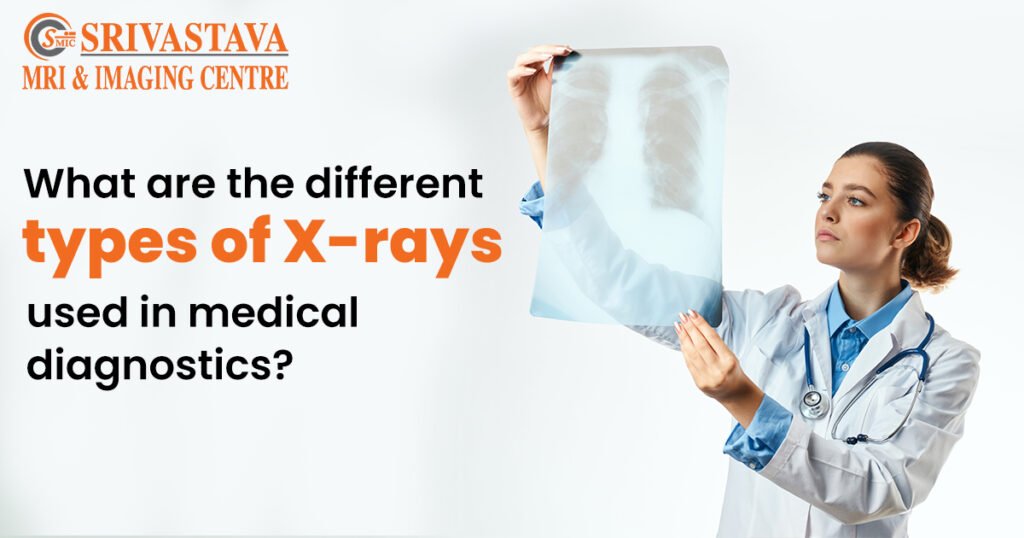X-rays are a cornerstone of modern medical diagnostics, providing a non-invasive way to look inside the body and diagnose various conditions. Since their discovery over a century ago, X-ray technology has advanced significantly, leading to the development of different types of X-rays tailored to specific medical needs. If you’re searching for an X-ray Centre in Kalkaji, Srivastava MRI & Imaging Centre offers state-of-the-art X-ray services that cater to a wide range of diagnostic requirements.
1. Conventional X-rays
Conventional or standard X-rays are the most common type of X-ray used in medical diagnostics. This imaging technique involves passing X-ray beams through the body to capture images of bones and certain soft tissues. The resulting images can help diagnose fractures, infections, and other abnormalities.
Applications:
- Bone Fractures: X-rays are highly effective in detecting bone fractures, breaks, and dislocations.
- Chest X-rays: These are used to examine the lungs, heart, and chest wall, often helping to diagnose conditions like pneumonia, heart failure, and lung cancer.
- Abdominal X-rays: These are used to investigate issues such as kidney stones, bowel obstructions, and certain types of abdominal pain.
Advantages:
- Quick and Painless: Conventional X-rays are fast, non-invasive, and generally painless.
- Widely Available: This technology is available at most medical facilities, making it accessible to a large number of patients.
2. Computed Tomography (CT) Scans
CT scans, or computed tomography scans, are an advanced form of X-ray that takes multiple cross-sectional images of the body from different angles. These images are then combined to create a detailed, three-dimensional view of the inside of the body.
Applications:
- Brain and Spine: CT scans are often used to detect tumours, blood clots, and other abnormalities in the brain and spine.
- Chest and Abdomen: These scans are useful for diagnosing conditions in the chest and abdomen, such as cancer, infections, and vascular diseases.
- Trauma: CT scans are commonly used in emergencies to quickly assess the extent of injuries.
Advantages:
- High Detail: CT scans provide more detailed images than conventional X-rays, making them useful for complex cases.
- Versatile: They can be used to examine almost any part of the body, from the head to the abdomen.
3. Fluoroscopy
Fluoroscopy is a type of X-ray that produces real-time moving images of the inside of the body. It involves the continuous passing of X-rays through the body, with the images displayed on a monitor.
Applications:
- Barium Swallow Tests: Fluoroscopy is used to examine the oesophagus and stomach by watching the movement of barium through the digestive tract.
- Cardiac Catheterization: This technique is used to visualize the blood vessels and chambers of the heart during procedures like angioplasty.
- Joint Injections: Fluoroscopy helps guide injections into joints for both diagnostic and therapeutic purposes.
Advantages:
- Real-Time Imaging: The ability to see movement in real-time is particularly useful in procedures that require precision.
- Guidance for Procedures: Fluoroscopy is often used to guide surgical and non-surgical procedures.
4. Mammography
Mammography is a specialized type of X-ray used specifically for imaging the breast tissue. It plays a crucial role in the early detection and diagnosis of breast cancer.
Applications:
- Screening for Breast Cancer: Mammograms are used as a preventive measure to detect breast cancer in its early stages, often before symptoms develop.
- Diagnostic Mammograms: These are performed when there is a concern, such as a lump or unusual findings in a screening mammogram.
Advantages:
- Early Detection: Mammography is the most effective tool for early breast cancer detection.
- Targeted Imaging: It focuses specifically on breast tissue, providing detailed images that are crucial for diagnosis.
Choosing the Right X-ray
The type of X-ray you need depends on your specific medical condition. If you’re in search of an X-ray Centre in Kalkaji, Srivastava MRI & Imaging Centre offers a comprehensive range of X-ray services, including conventional X-rays, CT scans, fluoroscopy, and mammography. Their experienced radiologists ensure that you receive accurate diagnostics in a comfortable environment.
X-ray technology continues to be an indispensable tool in modern medicine, offering a variety of imaging options to diagnose and monitor a wide range of health conditions. Whether you’re dealing with a bone fracture, or heart issue, or need a routine screening, understanding the different types of X-rays can help you make informed decisions about your healthcare.



